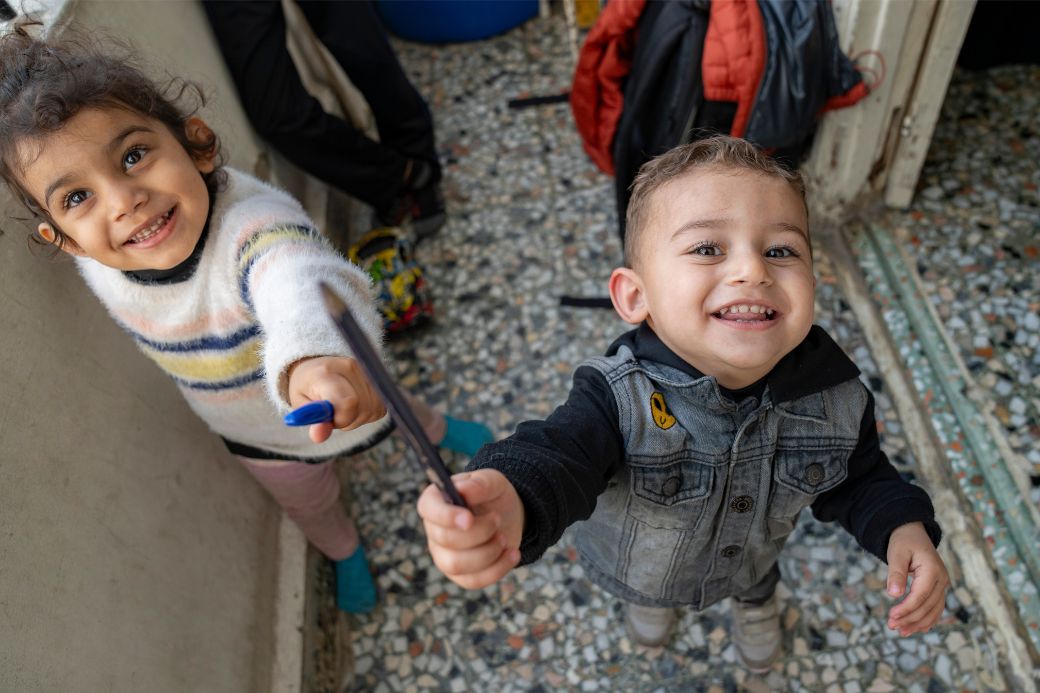In Lebanon, the emergency shows no sign of abating. Since September 2024, a new and violent escalation of conflict in the South and East of the country has triggered a humanitarian crisis that further worsens an already deeply compromised socioeconomic situation. Today, more than 3.7 million people – almost two-thirds of the entire population – are in need of humanitarian assistance. Among them, 1.3 million are children, whose childhoods have been shattered by fear and instability.
Following bombings and clashes in the southern suburbs of Beirut, in the South of the country and in the Bekaa Valley, over 1 million people were forced to flee. With the ceasefire, many have been able to return to their villages, but more than 100,000 people remain displaced: entire families who had to leave their homes to seek safety, taking refuge in schools, public buildings, or with acquaintances – often in precarious and overcrowded conditions.
Adding to this is another alarming figure: over 1 million people in Lebanon are currently experiencing acute food insecurity. The conflict has affected the areas where most of the country’s agricultural production is concentrated, impacting both harvests and the population’s livelihood opportunities. In many parts of the country, putting a hot meal on the table has become a daily struggle.
An integrated response to support the most vulnerable
In this emergency context, CESVI launched the project “Multi-sectoral humanitarian assistance for the protection of displaced civilians in Lebanon”, funded by the Italian Cooperation and carried out in collaboration with partner organisation Mousawat. The project aims to respond to the needs of displaced families, both in collective shelters and in host communities. The intervention focused on the areas most affected by the crisis – Beirut, Mount Lebanon, Saida and Baalbek – where the mass arrival of displaced people and their subsequent return further strained already heavily burdened services.
Throughout the project, CESVI distributed 1,000 emergency kits and 806 hygiene kits, essential for facing the winter months safely and with dignity. At the same time, over 750 families received food parcels, helping to alleviate food insecurity, which particularly affects the most vulnerable households. Moreover, CESVI provided economic support to 445 especially fragile households, enabling them to meet daily expenses in a context of growing poverty.
But the response did not stop at material assistance. Through the deployment of mobile medical clinics run by our partner Mousawat, more than 3,000 medical consultations were provided, also reaching remote and isolated communities. And for over 600 children – many of them traumatised by violence and displacement – psychosocial support pathways were activated, offering a safe space where they could go back to simply being children, while also providing support to their families.
“We lived through two very difficult months. The bombings continued day and night; we didn’t know where to hide. My children were terrified, they couldn’t sleep, they cried all the time. In that chaos, we met the CESVI workers, who helped us a lot. Now my children are colouring, drawing, and smiling again. It’s as if they are finally coming out of that darkness,” recounts Hossam, a father of five and displaced in Baalbek during the early months of the conflict escalation.
The crisis in Lebanon remains far from a resolution, and the future of millions continues to hang in the balance between uncertainty and need. In this context, CESVI and the Italian Cooperation remain at the side of the most affected and vulnerable communities, responding to the needs of those who, every day, try to rebuild their lives.
© Photo by Francesca Volpi and Ali Khedr
